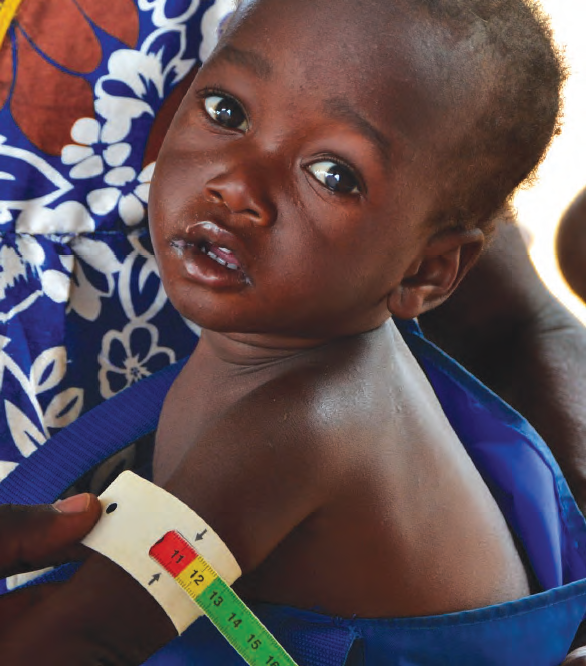Editorial
 By Lola Gostelow and Helen Young
By Lola Gostelow and Helen Young
In 1997 we were honoured to write the first Field Exchange (FEX) editorial. Now, fifty editions and nearly 20 years later, we have been given the privilege once more, to mark this ‘golden’ edition.
Our vision of FEX in 1997 embodied three things: joint learning; shared investment; and multi-disciplinary relevance. We’d like to explore the degree to which each of these has been realised.
 FEX was launched as a result of wanting to share and learn from the growing experience of addressing nutrition in emergencies. As the distribution figures above show, the sharing is certainly taking place. In terms of learning, it seems that FEX’s greatest impacts have been in personal and institutional learning: Results from a recent on-line evaluation of FEX (summarised in this edition) reveal that 80% of the 130 or so respondents felt that FEX benefits them most for personal learning; and nearly 50% indicated that FEX has influenced organisational strategy.
FEX was launched as a result of wanting to share and learn from the growing experience of addressing nutrition in emergencies. As the distribution figures above show, the sharing is certainly taking place. In terms of learning, it seems that FEX’s greatest impacts have been in personal and institutional learning: Results from a recent on-line evaluation of FEX (summarised in this edition) reveal that 80% of the 130 or so respondents felt that FEX benefits them most for personal learning; and nearly 50% indicated that FEX has influenced organisational strategy.
FEX was also launched on the premise that it could only be kept alive and relevant if we invested in it. Field Exchange has privileged the publishing of field articles, recognising the intrinsic value of sharing actual on the ground experience. Importantly, FEX has kept the barriers to entry low and worked closely in support of authors, so as to encourage a wide range of contributions. This reality check by practitioners is unique and is a vital reflection on the sector – in terms of the new trends and innovations that are happening and the realities that field workers have to face. This is perhaps its greatest value and unique contribution to the sector over its 18-year history. Yet, the evaluation indicates that only a small proportion of the FEX community (15%) provide articles. Perhaps this signals a reminder for us all to become more active contributors so that we can sustain this valued resource. Reflecting on the findings of the evaluation, the editorial team also recognise there is more they can do to ‘advertise’ the article development process and the support they can give (43% who did not contribute were unsure of the process). Today’s FEX community is largely new – only 34% of respondents have been reading FEX for more than 5 years. So, it would appear that the FEX formula created by the nineties’ nutrition community is just as relevant in the 2010s as well.
The need for greater connectivity across sectors, disciplines and levels is as relevant today as it was in 1997. We envisioned FEX supporting “a triangle of cross-fertilising communication and exchange” between field, head office and research communities. Three years later, in another editorial, Lola wrote:
“The compound of research and practice makes for a powerful concoction, and it is exactly this synergy that Field Exchange has catalysed so powerfully: providing a forum for field practice to be exchanged and explored while also sharing research and academic insights that could influence future programming and priority-setting.”
Perhaps the strongest connectivity has emerged in bridging research and practice, and bridging HQ to field. For example, the evaluation reveals that nearly 60% of respondents see FEX’s impact in the application of evidence to field practice. More difficult, however, is to judge the degree to which FEX has helped to span sectors. And yet, the orchestrated efforts of multiple sectors is precisely what is needed to scale-up impact on undernutrition. This might be a useful signpost for the future evolution of FEX and the ENN; indeed, already significant steps are being taken in that direction with a special issue of FEX on nutrition-sensitive programming planned for the end of the year and a new programme of knowledge management support by the ENN to the SUN Movement in development.
FEX has charted the major technical developments and revolutions in the field of nutrition in emergencies, including for example:
- The management of severe malnutrition, with the introduction of a community based care model, combined with evidence based treatment protocols and therapeutic foods.
- Developments in infant and young child feeding, showing how collective efforts can produce global results.
- The programmatic changes with improved registration, targeting and food distribution.
- The standardisation of nutrition survey procedures (SMART), and further development of nutrition and food security monitoring and phase classification (the Integrated Phase Classification System).
- The burgeoning interest in and application of livelihoods and food security responses, especially in designing cash transfers to improve nutritional outcomes.
The role FEX and ENN have played in the evolution of thinking and practice around IYCF deserves special mention. The very first edition featured guidelines on feeding infants under 6 months in emergencies (IFE), as well as a discussion on the challenges of meeting the needs of breastfed and non-breastfed infants as experienced in programmes in Former Yugoslavia. This proved a sign of things to come, with IFE a recurring theme over the years, including a special featured edition (Issue 34) and one of the notable experiences emerging from the Syria response (Issue 48). Whilst there has been huge progress, this 50th edition reflects continuing challenges; ebola being the new topic, infant formula 'troubles' the ‘old’ one.
Beyond the technical, FEX has also reported on institutional developments, including the development of the Sphere Minimum Standards (that started in 1997, just after the launch of FEX); the introduction of the Global Nutrition Cluster in 2006; the emergence of the Scaling Up Nutrition (SUN) Movement from 2010; and growth in training programmes and courses from field to Masters level.
Today, FEX reaches over 4,000 people by post in 124 countries, with additional online access amounting to around 11,500 views of articles monthly. Its younger sibling, Nutrition Exchange, was born in 2009. It has a print run of 17,500, goes to 87 countries, with an additional 4,817 soft copies emailed out. These figures reflect the strength of demand for what FEX (and NEX) offers.
Looking forward, perhaps the time has come for more reflection on how the world out there is affecting humanitarian response to (mal)nutrition in emergencies. For example, in many contexts the risks facing humanitarian actors have increased to unacceptable levels, leading to the securitisation of aid, and distancing between fieldworkers and affected communities. How has this affected the lives of fieldworkers and their relationship with, and impact on, the people they are trying to help? There is also an increasing number of actors engaged in supporting nutrition in emergencies - ranging from local community based organisations, who are often operating alone on the front line, to the massive food trucking operations and commercial enterprises that provide nutritional products. The discourse around resilience is yet another influence on humanitarian response, challenging (once more) the disservice that the emergency/development silos have on effective programming. FEX has a role to play in reflecting these new and very different realities.
Nutrition has truly come of age. The unprecedented international, political and domestic mobilisation to address undernutrition in all its forms is an exciting, and ambitious, wave to be riding. We have, for the first time ever, global targets for stunting and wasting. We have a constantly changing landscape of institutions and actors, and a plethora of nutrition initiatives to improve practice, standardise procedures and achieve better results. Since FEX was first established, it has diligently captured the breadth and depth of this experience for all to learn from. For the future, practitioners will need to continue to play a vital role in critiquing, and influencing, the latest developments.
FEX is a pretty unique forum - the fact that FEX has continued for so long, and largely unchanged in its format, is a resounding affirmation that it met, and continues to meet, a felt need. FEX is golden not just in age but also in value.
Lola Gostelow is an independent humanitarian consultant with over 20 years of experience in the aid sector. Originally trained and working as a nutritionist and food security analyst, the last twelve years of her work have focused on humanitarian policy, coordination and partnerships.
Helen Young has been a Research Director with the Feinstein International Centre since 1998, and a Professor with Tufts University for more than 10 years. She has been active in humanitarian response and development since 1985.


